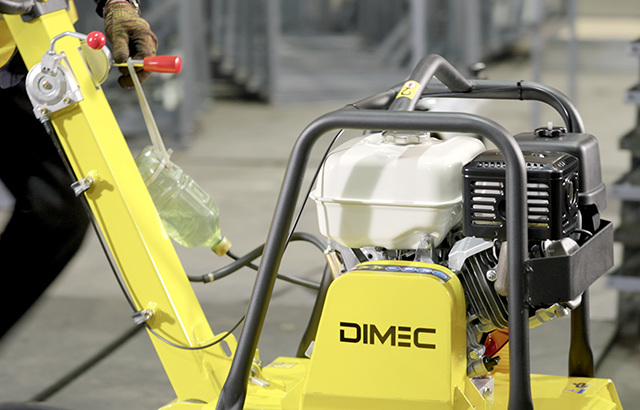The Ultimate Guide to Buying a Diesel Plate Compactor
- DIMEC
- Diesel Plate Compactor, Plate Compactor
- 02/07/2024
Home » The Ultimate Guide to Buying a Diesel Plate Compactor

Table of Contents
A diesel plate compactor is a powerful tool used in construction for compacting soil, gravel, concrete, and asphalt. These machines are essential for creating a stable and level base in various construction projects. Choosing the right diesel plate compactor can be challenging, given the variety of options available. This guide will walk you through the essential factors to consider to make an informed purchase.
1. Understanding Plate Compactors
What is a Diesel Plate Compactor?
A diesel plate compactor uses a heavy plate that vibrates to compact materials. The diesel engine provides the power to move and vibrate the plate, making it suitable for heavy-duty tasks.
Types of Plate Compactors
- Single-Plate Compactors: Best for small to medium-sized projects. They are light and easy to maneuver.
- Reversible Plate Compactors: Offer forward and backward motion, suitable for larger areas and more demanding tasks.
- Heavy-Duty Plate Compactors: Designed for industrial use, these compactors can handle the toughest jobs.
2. Key Features to Consider
Engine Power
The engine power, measured in horsepower (HP), determines the compactor’s performance. Higher horsepower engines can handle more demanding tasks and provide better compaction.
Plate Size
The size of the plate affects the compactor’s efficiency and suitability for different projects. Larger plates cover more ground, making them ideal for extensive areas.
Centrifugal Force
Measured in pounds or kilonewtons (kN), centrifugal force indicates the compactor’s ability to compact materials. Higher centrifugal force means better compaction.
Vibration Frequency
The vibration frequency, measured in vibrations per minute (VPM), affects the compaction quality. Higher VPM usually leads to better compaction results.
Travel Speed
The travel speed determines how fast the compactor can move while compacting. Faster speeds can increase productivity, especially on larger projects.
Fuel Efficiency
Diesel engines are known for their fuel efficiency and durability. Check the fuel consumption rate to estimate operational costs.
3. Additional Features
Water Tank
Some plate compactors come with a built-in water tank, essential for compacting asphalt and preventing dust during operation.
Foldable Handle
A foldable handle makes the compactor easier to transport and store.
Protective Frame
A protective frame can safeguard the engine and other components from damage during operation.
4. Brand and Warranty
Reputable Brands
Opt for compaction equipment from reputable brands known for their quality and reliability. Brands like Wacker Neuson, Bomag, and Mikasa are well-regarded in the industry.
Warranty and Support
A good warranty can save you from unexpected repair costs. Check the warranty terms and ensure that the manufacturer provides adequate support and service.
5. Budget Considerations
Initial Cost
Diesel plate compactors can be a significant investment. Compare prices from different suppliers to get the best deal.
Operating Costs
Consider the long-term operating costs, including fuel consumption, maintenance, and repair expenses.
6. Safety and Maintenance
Safety Features
Look for safety features like emergency shut-off switches, vibration dampening handles, and engine protection systems.
Maintenance Requirements
Regular maintenance is crucial for the longevity and performance of your compactor. Check the manufacturer’s maintenance guidelines and ensure you can meet them.
7. Where to Buy
Online Retailers
Websites like Amazon, eBay, and specialized construction equipment stores offer a wide range of diesel plate compactors. Ensure the retailer is reputable and offers good after-sales support.
Local Dealers
Local dealers can provide personalized advice and support. They might also offer demonstrations and maintenance services.
Auctions and Used Equipment
Consider buying used equipment from auctions or classified ads to save money. Ensure the machine is in good condition and check its history.
Conclusion
Buying a diesel plate compactor involves careful consideration of various factors, including engine power, plate size, centrifugal force, and additional features. By understanding your project requirements and evaluating different options, you can select the right compactor for your needs. Remember to consider the long-term costs and maintenance requirements to ensure your investment remains valuable over time.
You May Also Like